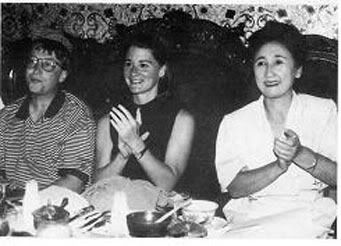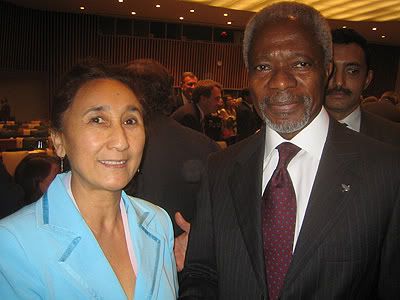Rabiya Kadeer and the Nobel Peace Prize


Rabiya Kadeer with Bill Gates in 1994 (above) and Kofi Annan in 2006 (below)
In 1998, I was eating laghman at a Uyghur ashkhana (eatery) in the Uyghur section of Urumqui. The owner, hearing that I spoke Uyghur, began to talk with me. Upon learning that I lived in Almaty, we exchanged information about the Uyghur community in Kazakhstan. Then, he asked me if I had ever met Rabiya Kadeer. I said that I had not, but I had heard much about her. Then, about ten minutes later, none other than Rabiya Kadeer herself came by the ashkhana. The owner introduced me to Rabiya-khonam, and she asked me to come to her office in fifteen minutes on the top floor of her department store that was next to the eatery. After ascending the stair case past numerous security officers, I came to her office. She invited me in, and she told me that she was very pleased to learn that I was studying Uyghur history and culture. She gave me one of her husband’s book, and she thanked me as an American for the United States’ acceptance of her husband and daughter as refugees. Then, she proceeded to tell me that she was under house-arrest for having helped the families of men who had been killed as a result of the 1997 Kuldja protests. I could feel that I was in the presence of somebody great, a person who could stand up to the largest state in the world for something in which she believed. Less than a year later, Rabiya Kadeer was imprisoned for passing state secrets to foreigners. She had given publicly available newspaper clippings to a congressional research delegation from the United States. Rabiya spent six years in jail and was only released last year.
Rabiya Kadeer is indeed a special person. Until her arrest, she had accomplished incredible achievements as a female minority in the Chinese state. She had become a millionaire through China’s trade with Central Asia, and she had founded a grassroots NGO to support Uyghur mothers in their attempts to pursue a career and support their families. After a story about her business prowess had appeared in the Wall Street Journal in 1994, Bill Gates and Warren Buffet even flew to meet her as respect to the great obstacles she had traversed in becoming the first Uyghur woman millionaire in China.
Last summer, I saw Rabiya again in Washington, DC, where she spoke before a modest audience of various people at Johns Hopkins School for Advanced International Studies (SAIS). While she was frustrated by the inability of her translator to catch all the nuances of her speech, she spoke passionately about being held in solitary confinement and being prevented from speaking to any other human for several years on end. Rabiya could not be broken.
I was very pleased to hear that Rabiya-khonam had been nominated for the Nobel Peace Prize this last week. This transpired as her three sons remain detained by Chinese authorities and one of her daughters remains under house arrest in Urumqi, the capitol of the Xinjiang Uyghur Autonomous (sic) Region of China. Rabiya did not win the prize, but she was graceful as always in congratulating Muhammed Yunus of Bangladesh who had been given the award. She also took the opportunity to ask Mr. Yunus to introduce his poverty reduction program in her homeland of Eastern Turkestan (Xinjiang) in order to assist Uyghurs suffering from poverty. While the Uyghurs in the northwest of China face being overwhelmed by Han Chinese immigration into Eastern Turkestan (Xinjiang), I have no doubt that Rabiya Kadeer will continue to serve the difficult role of being the conscience of the international community, which generally is blinded to the Uyghurs’ plight in China given the economic importance of the PRC. While she did not win the Nobel Peace Prize this year, Rabiya Kadeer is a person who deserves our greatest respect.



11 Comments:
Hello. I am a Japanese who are interested in the Uyghurs, and make an blog clipping news about them.
It is adorable that you met Ms.Rebiya and made freindship.
Now I linked your article and, I noticed trackbacked automatically.
That's amazing.
I heared you will come to Japan and give an lecture.
That is great too.
Thank you.
She's not entirely innocent...
I'm glad that the Uyghurs want independence and happiness, but they killed innocent Chinese citizens in the uprisings. She orchestrated them. Does she deserve a Nobel Peace Prize? People were killed, not directly by her, but through her. I thought the Nobel prize was worth more than that.
The situation is the same with the Dalai Lama.
Unfortunately, I didn't see the Epoch Times mention anything about the hundreds of Chinese citizens killed in the uprisings. The Uyghurs are a protected minority. They are allowed into college on lower scores, and the government provides them food and shelter for free when they get into college. It's not wrong that the Chinese government should arrest terrorists.
But I guess to Americans, a Chinese life will always be worth less, right? Never mind hundreds.
The Uyghurs were arrested, but not killed. It's such a terrible crime that they should be detained for murder, I don't know what China is thinking.
I love biased media.
I've really enjoyed having a look around your blog today, keep up the good work!
It's great when you are just surfing the web and find something wonderful like this!
I admire the valuable information in this page. I will bookmark this page and have my friends check up here often. I am quite sure they will learn lots of new stuff here than anybody else!
I really liked your article.
I am really thankful for the information you have provided. You are helping others to grow their knowledge by sharing such a valuable information you have. This post is amazing & I'm glad for it.
hello
I really enjoy reading the post, thanks for sharing I really like it, I already bookmarked it, thank you guys.
Jestem pod wrażeniem. Bardzo ciekawie napisany artykuł.
Podoba mi się Twój styl pisania
Post a Comment
<< Home